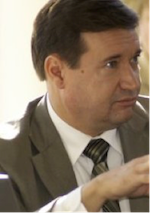We are delighted to highlight Dr. Preston. His many scholarly accomplishments, which include numerous publications, presentations, and external funding awards would provide sufficient reason to honor him. Yet there is more to Dr. Preston than one will find in his scholarly work. Dr. Preston has an uncanny zeal to serve. We could string together a lengthy series of banal platitudes (he’s indefatigable, precious, a treasure, and so on), but we prefer that you gain your own personal sense for the man. We asked Dr. Preston some questions about North Carolina, Indiana, mathematics, mathematics education, higher education administration, service, and gardening. We invite you to read his replies in order to gain a sense for his keen insights.
1. Is North Carolina or Indiana your favorite State in the USA or do you find the two States equally appealing? Why?
This is a hard one for me. I have very good memories and feelings about both states. It may seem like the easy way out to say NC since the readers are much more likely to reside in NC than IN. However, I will go with NC because this is where I have church, colleagues, friends, and a level of comfort that I would not have if I was suddenly transplanted to Indiana.
2. Why do you enjoy gardening?
I enjoy seeing plants grow. I like seeing people grow more than plants, but sometimes the plants grow more quickly and in ways that are easier to measure than the growth of our students.
3. What intrigues you, personally, about mathematics?
The dual nature that I see in mathematics. I see this particularly in mathematical modeling – mathematics is an incredibly useful tool for understanding our world, for describing it, for solving problems that exist in it, and for making decisions about our future with it. But it is also an art – there is an art to solving problems, to choosing the particular mathematics to bring to bear on a situation, and for communicating the results of your work.
4. In your view, what mathematics knowledge and skills are required for literacy?
Mathematical literacy is very broad, but the first two areas I think about are numeracy (number sense) and stochastic reasoning (data and probability sense). For many people who have careers that are not mathematics intensive, much of the mathematics they encounter is from the number strand – computation with whole numbers; work with fractions, decimals, and percents. But more and more, our citizenry is asked to be consumers of data-infused information and, in many cases, actual users of data.
5. When teaching mathematics educators, what instructional methods do you find effective and inspiring?
I particularly enjoy methods that I did not experience in any great measure as a student. In fact, my first big lesson as a teacher was to understand that how I learned mathematics was not going to be effective for many of my students. I had to learn how to use more visual approaches. I also enjoy teaching through application, but understand that for every student who is motivated by a certain application, there will likely be at least two students who are not enamored with that application.
6. As President of the NC division of the National Council of Teachers of Mathematics, what insights have you gained into the state of mathematics education in North Carolina.
I have learned that there is a lot of mathematics talent among the membership of NCCTM, a lot of passion about mathematics teaching and learning, and a lot of willingness to share that talent and passion. Around the state, the mathematics education community has a lot of work to do, not just in educating our students (although we cannot forget that is our primary goal), but in sharpening our skills by working with each other, and by educating important constituent groups such as parents, community leaders, and school board members.
7. Among the administrative roles you have held, what does your current position of Director of Students in the Department of Mathematics, Science, Instructional Technology Education offer, which is not available in other roles?
Although sometimes I feel pulled in different directions as I work with recruitment, advising, curriculum, connecting with alumni, advocating for course offerings, etc., I am at the root of it all working for the benefit of students. One of my advisors and supporters in Flanagan is Joyce. Sometimes she will see me early in the morning and ask me why I am dressed up. I will tell her that I am meeting with some very important people and that I am hoping to make a good impression. I think she knows by now that when she asks who I am going to meet with that day that it is going to be students or maybe prospective students. “None of us would be needed here if we did not have students.” I know we do a lot of important work in generating new knowledge, serving as an economic engine for the region, etc., but without students . . . I am quick to add, however, that we need student-centered instructors, housekeepers, chairs, deans, and even upper administrators. Not all of these positions have as much contact with students as I have, but if we do not make student-centered efforts and decisions, we will be the poorer for it as an institution.
8. What drives you to serve others?
I like to help. I get a lot of satisfaction from helping others and seeing them succeed. Sometimes service to others means providing a helping hand. Sometimes it means being an advocate for a student or elaborating on the curriculum the student will take. At the heart of my motivation are some words in Matthew 25 of the Bible.
Dr. Ron Preston: Scholar, Collaborator, Helper

I learn something new about every time Dr. Preston speaks. He’s awesome!